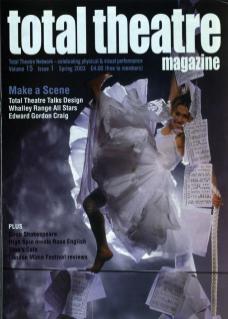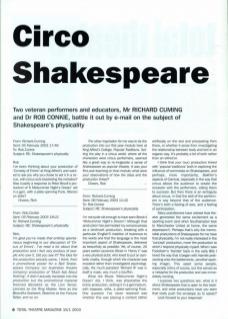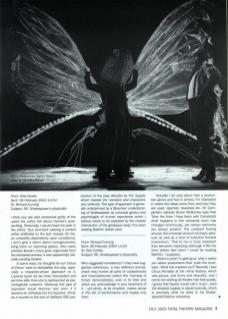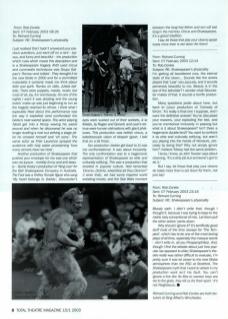From: Richard.Cuming
Sent: 05 February 2003 17:46
To: Rob.Conkie
Subject: RE: Shakespeare's physicality
Rob I've been thinking about your production of Comedy of Errors at King Alfred's and wanted to ask you why you chose to set it in a circus, with circus acts bracketing the narrative? Was it partly a response to Peter Brook's production of A Midsummer Night's Dream set in a gym, with a plate-spinning Puck, Oberon on stilts?
Cheers, Rich
From: Rob.Conkie
Sent: 05 February 2003 18:21
To: Richard.Cuming
Subject: RE: Shakespeare's physicality
Rich, I'm glad you've made that entirely spontaneous beginning to our discussion of Circus of Errors. I've read a lot about that production and I feel very envious of people who saw it. Did you see it? The idea for the production actually came, I think, from a promotional poster for a Bell Shakespeare Company (an Australian theatre company) production of Much Ado About Nothing. It didn't actually translate into the production but the promotional material featured Benedick as the Lion Tamer, Leonato as the Ring Master, Hero as the Beautiful Assistant, Beatrice as the Fortune Teller, and so on.
The other inspiration for me was to tie the production into our first year module here at King Alfred's College, Popular Traditions. Setting the play in a circus world, where all the characters were circus performers, seemed like a great way to reinvigorate a sense of Shakespeare as popular theatre. It was your first year teaching on that module; what were your observations of how the class and the production linked?
Cheers, Rob
From: Richard.Cuming
Sent: 06 February 2003 11:42
To: Rob.Conkie
Subject: RE: Shakespeare's physicality
I'm not quite old enough to have seen Brook's Midsummer Night's Dream! Although that production has permeated my consciousness as a landmark production, breaking with a particular (English?) tradition of reverence to the words and that the language is the most important aspect of Shakespeare, delivered as beautifully as possible. Yet, of course, 20 years earlier Laurence Olivier in Henry V was a very physical actor, who loved to put on symbolic masks, through which the character was revealed rather than investigated psychologically. His much-parodied Richard III was in itself a mask, very much a bouffon.
What the Brook Midsummer Night's Dream did, I think, was physicalise the entire production, setting it in a gymnasium, with trapezes, stilts, a plate-spinning Puck. One question I've never resolved was whether this was placing a context rather artificially on the text and proceeding from there, or whether it arose from investigating the relationship between body and text in an organic way. It's probably a bit of both rather than an either/or.
I think that your (our) production linked with 'popular traditions' both in exploring the influence of commedia on Shakespeare, and perhaps, more importantly, Bakhtin's aspects of Carnival, especially in the way that circus allows the audience to create the occasion with the performers, willing them to succeed. But then there is an ambiguity about circus, in that the skill of the performers is way beyond that of the audience. There's both a feeling of awe, and a feeling of participation.
Many practitioners have wished that theatre generated the same excitement as a sporting event (and when Southampton lose to Manchester United at home, the same depression!). Perhaps that's why the memorable productions of Shakespeare for me have that physicality. I'm not really interested in the 'concept production’, more the production to which I respond physically myself. When I saw Footsbarn's Hamlet back in the early 80s I loved the way that it began with Hamlet pole-vaulting onto the battlements (another sporting image). This upset some people, especially critics of course, but this served as a metaphor for the production and was immediately exciting.
I suppose two questions are: what is it about Shakespeare that is open to this treatment, and what productions have you seen that really push the envelope so to speak?
Look forward to your response!
From: Rob.Conkie
Sent: 06 February 2003 13:04
To: Richard.Cuming
Subject: RE: Shakespeare's physicality
I think you are also somewhat guilty of the upset the critics felt about Hamlet's pole-vaulting. Personally, I would insert the pole in the critics. Your comment placing a context rather artificially on ‘the text' reveals, for me, an unhealthy dependency upon consistency. I don't give a damn about incongruencies, bring them on (spinning plates). Who cares whether Brook's circus grew organically from the rehearsal process, it was (apparently) radically exciting theatre.
In some ways, my thoughts for our Circus of Errors were to destabilise the play, especially a character-driven approach to it. Luciana could not be more inconsistent and yet time after time she is represented as psychologically coherent. Obviously this type of approach would become very worn if it became an orthodoxy but it is required, I think, as a counter to the sort of (brilliant) RSC production of the play directed by Tim Supple which treated the narrative and characters very seriously. This type of approach is generally underpinned by a Bloomian understanding of Shakespeare as universal genius and psychologist of human experience which I believe needs to be exploded by the chaotic intervention of the grotesque body (I've been reading Bakhtin before bed).
From: Richard.Cuming
Sent: 06 February 2003 14:23
To: Rob Conkie
Subject: RE: Shakespeare's physicality
Who suggested consistency? I may have suggested coherence, a very different animal, which may involve all sorts of consistencies and inconsistencies (which the Comedy of Errors demonstrates, even in its title) and which you acknowledge in your treatment of it – yet which, at its simplest, makes sense in the act of performance and maybe only then.
Actually I do care about how a production grows and how it arrives; I'm interested in where the ideas come from and how they are used, rejected, reworked, etc. On Complicité's website Simon McBurney says that ‘Over the time I have been with Complicité what happens in the rehearsal room has changed enormously, yet certain elements are always present. The constant fooling around; the immense amount of chaos; pleasure as well as a kind of turbulent forward momentum.' That to me is more important than semantic nitpicking (although it fills the time before bed when I could be reading Bakhtin, I suppose).
Which is what I'm getting at, when I asked you about productions that push the envelope. What has inspired you? Recently I saw Circus Ronaldo at the mime festival, which was joyous, and funny and beautiful, and I came out wishing all theatre had that quality. I guess that Gaulier would call it ‘le jeu', even the deepest tragedy is played joyously, which is precisely what he does in his Shakespeare/Chekhov workshop.
From: Rob.Conkie
Sent: 07 February 2003 08:26
To: Richard.Cuming
Subject: RE: Shakespeare's physicality
I just realised that I hadn't answered your previous questions, just went off on a rant – joyous, and funny and beautiful – the production which I saw which meets this description and is a Shakespeare tragedy AND used circus and commedia techniques was Grupo Galpao's Romeu and Julieta. They brought it to the new Globe in 2000 and for a committed materialist it certainly made me think about faith and spirit. Romeu on stilts, Julieta balletic. There were puppets, masks, music, but most of all, joy, fun and beauty. On one of the nights I went it was drizzling and the young lovers' make-up was just beginning to run as the tragedy reached its climax. I think what I especially liked about this performance was the way it exploited (and confronted) the Globe's near sacred space. The actor playing Tybalt got into a frenzy waving his sword around and when he discovered he was no longer duelling a rival but striking a stage pillar he crossed himself and said 'oh sorry'. The same actor as Friar Laurence sprayed the audience with holy water proclaiming 'how many sinners have we here'.
Another production of Shakespeare that pushed your envelope for me was one which was not joyous – horribly funny and anti-beauty – Barrie Kosky's production of King Lear for the Bell Shakespeare Company in Australia. The Fool was a Shirley Temple figure who sang ‘My heart belongs to Daddy’, Gloucester's eyes were sucked out of their sockets, à la fellatio, by Regan and Goneril, and Lear's retinue were human-dalmations with giant phalluses. This production was hellish circus, a kaleidoscopic vision of despair (gosh, I laid that on a bit thick).
Our production (better get back to it) was not confrontational. It was about inclusivity. The only confrontation was to a hegemonic representation of Shakespeare as elite and culturally edifying. This was a production that revelled in popular culture. Nell lamented ‘Dromio, Dromio, wherefore art thou Dromio?' (I stole that), we had some inspired world wrestling moves, and the Star Wars moment between the long-lost father and son will last long in the memory. Circus and Shakespeare, it's a grand tradition.
I say, let those that play your clowns speak loads more than is set down for them!
From: Richard.Cuming
Sent: 07 February 2003 12:14
To: Rob.Conkie
Subject: RE: Shakespeare's physicality
I'm getting all bewildered now, the eternal state of the clown... Sounds like the actors played that Lear very joyously, and it sounds perversely beautiful to me. Beauty is in the eye of the beholder? I wonder what Gloucester makes of that. It sounds a terrific production.
Many questions jostle about here, but back to your production of Comedy of Errors. It's really a final one I suppose, and I want the definitive answer! You've discussed your reasons, your exploding of the text, and you've mentioned inclusivity in passing but what is it about Shakespeare? Isn't there a hegemonic double bind? You want to confront it as elite and culturally edifying, but aren't you playing into the hands of literature, precisely by doing this? Why not simply ignore him? I believe Tolstoy had the same problem.
I know, I know, as John Towsen says about clowning, 'It's a dirty job but someone's got to do it.'
But I say, let those that play your clowns do loads more than is set down for them, not just say!
From: Rob.Conkie
Sent: 07 February 2003 23:16
To: Richard.Cuming
Subject: RE: Shakespeare's physicality
Bloody oath. I didn't write that, though. I thought it, because I was trying to keep to the metre (very conventional of me). Let them pull the other actors' pants down.
Why should I ignore it? It's terrifically good stuff most of the time (except for The Tempest, which has to be one of the most boring plays of all time, especially the masque scene – don't write in, all you Prosperophiles). And, though I find the debate about just how popular (as opposed to elite) Shakespeare's theatre really was rather difficult to evaluate, I'm pretty sure it was lot closer to the new Globe atmosphere than the RSC at Stratford. The Shakespeare myth that I want to attack in my production work isn't his fault. You can't ignore a line like ‘As flies to wanton boys are we to the gods, they kill us for their sport.’ It's not Neighbours.
Richard Cuming and Rob Conkie are both lecturers at King Alfred's Winchester.



